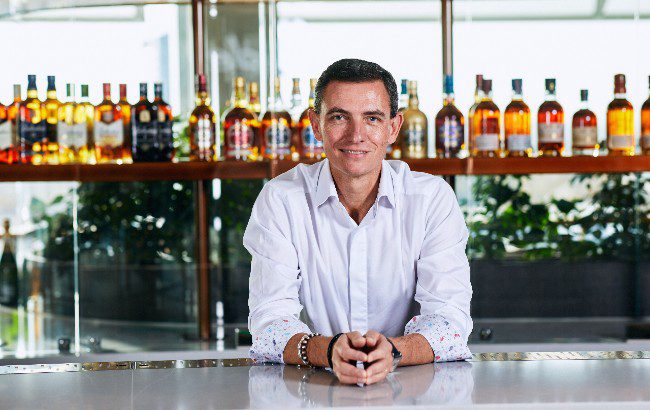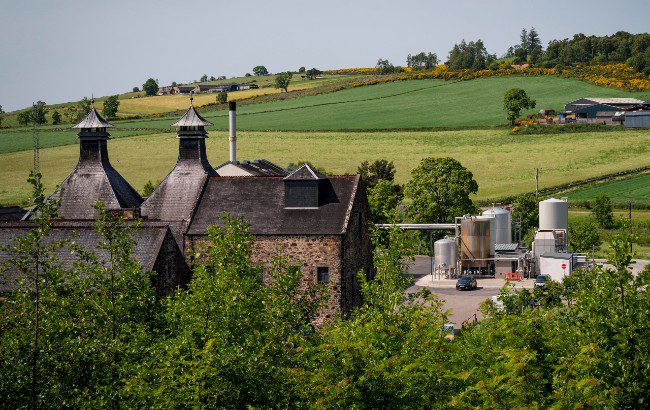Chivas CEO: ‘We must work together to protect the future of whisky’
Jean-Etienne Gourgues, chairman and CEO of Chivas Brothers, gives an exclusive comment on the company’s decision to put collaboration ahead of competition when it comes to working towards net zero.

Today, Chivas Brothers, the Scotch whisky arm of Pernod Ricard, revealed the insights and findings behind its enhanced heat recovery technology – which has already reduced the carbon emissions at its Glentauchers distillery in Speyside, Scotland, by half.
To support the Scotch whisky industry’s endeavours to achieve net zero, the Chivas Regal producer is making its technology openly available to other distillers.
Jean-Etienne Gourgues, chairman and CEO of Chivas Brothers, shares exclusively with The Spirits Business why the company decided to make this move.
Jean-Etienne Gourgues, chairman and CEO of Chivas Brothers
The story of Scotch whisky dates back more than 500 years. It has a rich and proud heritage, one that’s defined by opportunity, entrepreneurialism and a well-practiced ability to adapt with the times. These long-standing attributes are going to be even more critical when it comes to safeguarding its future.
We sit at a truly pivotal juncture for individuals, society and business. The effects of climate change should be of concern to us all and we each have a role to play in reducing our impact on the environment.
Alongside this, in Scotch whisky, our product is inherently linked with Scotland’s landscape, which helps provide our whiskies with their world-famous flavours. We must acknowledge that there is an impact on this environment from our work, and there is clearly more we must all do to mitigate this and sustain and support the landscape we rely on for generations to come.
The future clearly relies on us making changes today to protect the whisky of tomorrow. Yet despite some of the best efforts of many of us in our sector, whisky distillation has remained a carbon-intensive process. At least until now.
At Chivas Brothers we have been able to make some significant progress in this area. I am pleased to share the details of our most recent success along this journey with the wider industry, as we believe that it is only through collaboration and collective action that we can protect the environment that is critical to our collective success.
We’re making our experiences and detailed learnings from the application of heat recovery technologies during the distillation process open source, to encourage others in the industry to explore this and consider if it may be right for them. These technologies have the potential to significantly improve the efficiency of distillation. We’re releasing them as we believe this is the right thing to do, to help accelerate our industry’s journey on the road to net zero.
Our engineering team has worked hard at tackling this challenge using a combination of these technologies, which include mechanical vapour recompression (MVR) and thermo vapour recompression (TVR). These are all designed to capture and recycle heat generated in the early phase of distillation – heat that would otherwise go to waste – and use this to fuel the later stages.
Overcoming industry barriers
While these technologies in themselves are not new – nor are they practical for every distillery – successfully applying them to the process of distillation has been a barrier for our industry.
We’ve seen first hand the positive impact that these technologies can have. At our Glentauchers distillery, near Keith in Speyside, they led to a reduction of total energy consumption of almost half. In turn, this has reduced carbon emissions by 53% and could help us save more than 30,000 tonnes of CO₂ per annum if rolled out across all viable sites. This supports our ambitious goals of achieving carbon-neutral distillation by 2026 and a 50% reduction in the overall intensity of our carbon emissions by 2030.

We also estimate that if applied across the whole Scotch whisky industry, this could save enough energy to power all the homes in Edinburgh and Aberdeen every year (according to Ofgem’s average-UK-home data, and National Records of Scotland’s city-size data).
Alongside making our design process openly available to everyone, we’re also holding a series of open house events to give others from across the industry the chance to talk to our team and hear how they successfully incorporated these technologies into our distillation process.
Pursuing a ‘shared goal’
But we can’t stop here. There is no one road to net zero, and there is always more to be done; whether this is focused on packaging, water stewardship or regenerative agriculture. There is much potential for new thinking and fresh innovation.
Our hope is that this ethos of transparency is shared. I know other distilleries will be making their own new discoveries and improvements in this area and I look forward to working with my counterparts to continue collaborating and learning, in pursuit of our shared goal.
Quite simply, protecting the planet is a precondition for the future of our industry. It is essential that we come together and put collaboration ahead of competition. I firmly believe that distillers can and should work together to help create a sustainable future for whisky, continuing to work with suppliers, partners and each other to help guarantee Scotch’s future.
I would urge others in our industry to download our case study and consider whether these technologies could have a role to play in their operation.
Related news
Top 10 spirits launches in June
